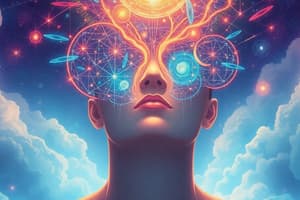Podcast
Questions and Answers
What category does the 'Me-Self' belong to in the theory of self-consciousness?
What category does the 'Me-Self' belong to in the theory of self-consciousness?
- The Thinking Self
- The Spiritual Self
- The Social Self (correct)
- The Material Self (correct)
What is the primary function of the 'I-Self' according to the theory developed?
What is the primary function of the 'I-Self' according to the theory developed?
- To represent social identities
- To embody spiritual beliefs
- To connect with the material world
- To think and reflect (correct)
How did William James refer to the 'I' part of the self?
How did William James refer to the 'I' part of the self?
- The Thinking Self (correct)
- The Empirical Self
- The Experiential Self
- The Bodily Self
Which aspect of the self is linked to the soul or mind according to the theory?
Which aspect of the self is linked to the soul or mind according to the theory?
In which year was the work 'Principles of Psychology' published?
In which year was the work 'Principles of Psychology' published?
How does self-awareness influence self-esteem?
How does self-awareness influence self-esteem?
Which of the following best describes a well-organized self-concept?
Which of the following best describes a well-organized self-concept?
What is likely a consequence of a limited self-concept?
What is likely a consequence of a limited self-concept?
In what way can understanding emotions contribute to personal growth?
In what way can understanding emotions contribute to personal growth?
What could indicate a conflict between self-esteem and self-concept?
What could indicate a conflict between self-esteem and self-concept?
What are the three distinct parts of self-concept according to Carl Rogers?
What are the three distinct parts of self-concept according to Carl Rogers?
What does self-esteem primarily reflect?
What does self-esteem primarily reflect?
What is meant by congruence in self-concept?
What is meant by congruence in self-concept?
How can incongruence affect mental well-being?
How can incongruence affect mental well-being?
Which part of the self-concept encompasses the attributes and qualities one wishes to possess?
Which part of the self-concept encompasses the attributes and qualities one wishes to possess?
What influences self-esteem according to Carl Rogers?
What influences self-esteem according to Carl Rogers?
What does self-image represent in Rogers' theory?
What does self-image represent in Rogers' theory?
If a person accepts themselves fully, what is likely to be the outcome?
If a person accepts themselves fully, what is likely to be the outcome?
What element is most crucial for demonstrating self-awareness in the reflections?
What element is most crucial for demonstrating self-awareness in the reflections?
In terms of self-awareness, how should responses be structured for excellence?
In terms of self-awareness, how should responses be structured for excellence?
Which type of response would typically receive an 'improvement' score?
Which type of response would typically receive an 'improvement' score?
What is the primary focus when reflecting on oneself in this context?
What is the primary focus when reflecting on oneself in this context?
How can the quality of responses impact the assessment score?
How can the quality of responses impact the assessment score?
What characterizes a 'good' response in the self-awareness reflection?
What characterizes a 'good' response in the self-awareness reflection?
What is the minimal condition for a response to be considered 'satisfactory'?
What is the minimal condition for a response to be considered 'satisfactory'?
What is the expected process for addressing the self-awareness reflection?
What is the expected process for addressing the self-awareness reflection?
What is a key feature of a thorough self-esteem reflection?
What is a key feature of a thorough self-esteem reflection?
Which of the following best describes a characteristic of the 'Discussion' section graded at 40 points?
Which of the following best describes a characteristic of the 'Discussion' section graded at 40 points?
In the context of providing examples, which option represents a lower quality submission?
In the context of providing examples, which option represents a lower quality submission?
Which of the following actions demonstrates an effective personal goal setting?
Which of the following actions demonstrates an effective personal goal setting?
What distinguishes a submission that shows good understanding compared to basic understanding?
What distinguishes a submission that shows good understanding compared to basic understanding?
How is 'basic articulation' defined in the context of self-esteem reflection?
How is 'basic articulation' defined in the context of self-esteem reflection?
What indicates a personal goal that is unclear or missing?
What indicates a personal goal that is unclear or missing?
Which statement exemplifies a limited understanding in a discussion?
Which statement exemplifies a limited understanding in a discussion?
What is the significance of providing thoughtful examples in self-esteem reflection?
What is the significance of providing thoughtful examples in self-esteem reflection?
What does limited understanding of applying insights typically reflect?
What does limited understanding of applying insights typically reflect?
Flashcards are hidden until you start studying
Study Notes
Self-Concept
- Carl Rogers developed the concept of self through his work with clients in person-centered therapy.
- He believed self-concept comprises three parts: ideal self, self-image, and self-esteem.
- Ideal Self: This represents the person you aspire to be, encompassing desired attributes, behaviors, and qualities.
- Self-Image:` This is how you currently perceive yourself, including physical characteristics, personality traits, and social roles.
- Self-Esteem: This reflects how much you value and accept yourself, influenced by thoughts and feelings about abilities and worth.
- Alignment: Congruence between the real self and the ideal self results in mental well-being. Incongruence, or a lack of alignment, can lead to mental distress.
Self-Awareness and Reflection
- Self-Awareness: Understanding your emotions, thoughts, and behaviors.
- Self-Concept: Your overall perception of yourself.
- Self-Esteem: The value you place on yourself.
- Personal Growth: Understanding these concepts can help you identify areas for improvement and work towards achieving your ideal self.
William James and the Self
- William James proposed a theory of self-consciousness in his book "Principles of Psychology".
- He divided the self into two categories: Me-Self and I-Self.
- Me-Self: This is the "empirical self," comprising aspects derived from personal experiences. It includes:
- Material Self: Physical possessions and belongings.
- Social Self: How you present yourself in different social situations.
- Spiritual Self: Your inner thoughts, beliefs, and values.
- I-Self: This is the "thinking self," responsible for consciousness and self-reflection. James associated it with the soul or mind.
Studying That Suits You
Use AI to generate personalized quizzes and flashcards to suit your learning preferences.




